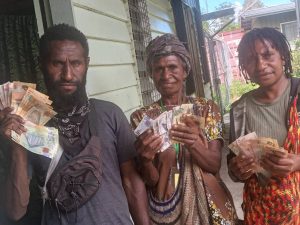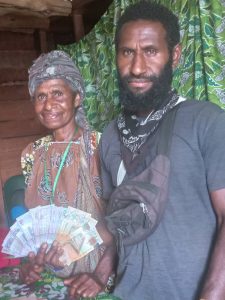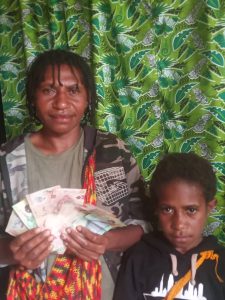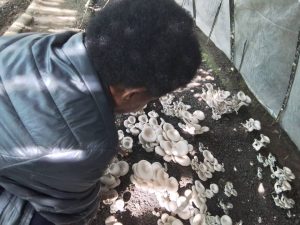Mercy Money and People Power
Life for Maria, aged 70, has always been a day-to-day struggle…
When her husband passed away she was left a widow and head of the household with seven small children. She struggled to care for them alone and was unable to pay school fees to educate her children to tertiary level.
Enter Mercy Works and our Simbu Project Coordinator Sr Maryanne Kolkia’s Leave No One Behind Savings and Loans Society (LNBLS). The simple concept invites every individual to be part of the development journey and transition from micro-enterprises (like her 30Kina Project) too Small to Medium Business Enterprises.

Of note is that 88% of participants in these SME’s are women – with all leadership roles being females as well. Pressure in these rural areas is often on women to meet the daily needs of self, children, family and others.
Essentially, the entrepreneurial capacity of individuals, families and communities is enhanced by promoting a saving culture and increasing access to credit to enable them to embark on income generating activities to sustain and improve their livelihoods.
“The idea is to build up what you get and give back to reach out to others,” says Sr Maryanne, the brains behind the operation. “This makes people feel loved and cared for. It promotes individual potential and boosts achieving personal ambitions. At the same time, working in collaboration promotes mutual trust, respect and reduces jealousy.”

Word of mouth has generated much interest in the Mercy Works initiative, with people in villages and clans taking their own initiative to mobilise and engage in development activities. Which is how Maria first heard of the idea.
“Accessing money before coming to Mercy Works was really difficult for me and my children,” reveals Maria. “My family’s cash flow was limited, there was not enough money available for us to pay for our needs and wants and earning some few kinas from selling garden produce once a while at the local market was not enough. As I am aging, my concern is my children’s well-being.”
Maria joined Sr Maryanne’s LNBLS through buying shares fortnightly. She received personal loans three times and was able to repay them with service charge within three months.
“I was convinced the financial services the Leave No One Behind Savings and Loans Society provides was the only way I could see myself and my struggling children get out of poverty into creating something new for their future,” says Maria.
Maria had three of her children work with her to access the first loan totalling PKG1,020 ($438). “It was indeed a marvellous gift for us to begin,” she smiles. “We collaborated and worked as a team by selling more than a thousand buns a day for PGK1 each as well as 120 cans of soft drink at PGK1.20 each at the main bus stop and repaid all three loans within two weeks.”
The family then applied for a second round of loans, totalling PKG2,250 ($968).

“My whole life with my children has changed. I see smiles on their faces, I feel good about myself and my children’s future. I began to have good sleep in the night, our daily meal has improved, I told them that we will never leave Mercy Works,” says Maria. “Mercy Works theme ‘Leave No One Behind’ speaks for itself.”
Maria says all she has ever wished for is her children to have the same quality of life as other families in the village when she is gone. And through Mercy Works that is now becoming a reality.
“I hope my children can build permanent houses, own PMV (public Motor Vehicle) buses and other businesses. That is my wish.”
Mercy Mushrooms
An additional income generating activity provided through the Mercy Works Leave No One Behind is our Mushroom Farming Club – which is engaging children and communities and being embraced “with open arms and gratitude,” says Sr Maryanne.

Following three days of mushroom training from a Chinese professor in Goroka, the “Leave No One Behind” mushroom business began with a total seed capital of PGK3,000 ($1,290) for materials and 767 tubers for planting.
After nearly three months of the first planting, money earned reached PGK2,050 ($818) which was used to extend the mushroom house and the remaining funds were spent on 800 more tubers for planting.
“The primary purpose of Mercy Works mushroom farming is not only to improve nutrition but to enhance a fast growing business with children, family and adults. Mercy Mushrooms are growing in popularity,” reports Sr Maryanne. “People can’t stop talking about it!”

 SHOP
SHOP




